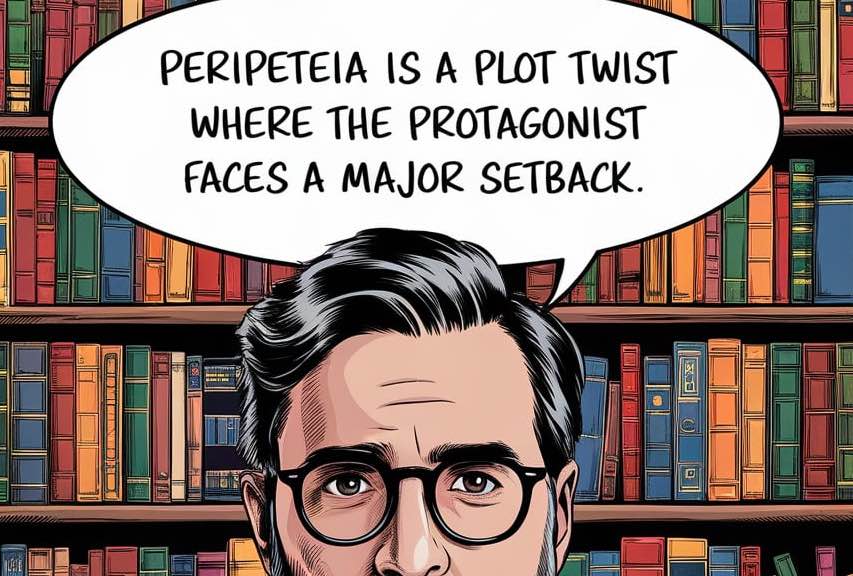Aristotle explored this concept in Poetics (Latin: De Poetica, circa 335 BCE), emphasizing its significance in tragedy. In Sophocles’ play Oedipus Rex, for example, the reversal of the protagonist’s fortune occurs when a seemingly innocuous revelation leads to his tragic downfall.
Peripeteia not only drives the narrative forward but also deepens the relationship between character and narrative structure. While its origins lie in classical literature, peripeteia remains a powerful storytelling technique in modern works, whether in novels, plays, or other narrative forms.
The Role of Peripeteia in Plot Structure
Peripeteia serves as a pivotal moment in narratives, marking a critical shift in a character’s fortune. Its defining feature is its impact—more than just a plot twist, it fundamentally alters the course of the narrative. Peripeteia’s roots in Greek theater underscore its centrality in classical tragedy, where an abrupt change in a protagonist’s fate often leads to tragic consequences.
Understanding peripeteia’s role through a variety of examples provides insight into its long-lasting influence on storytelling. In Oedipus Rex, the revelation of Oedipus’s true identity triggers a dramatic reversal, shifting the narrative from prosperity to ruin. Unlike other narrative surprises, peripeteia is integral to the plot’s progression, serving as a moment of inevitable fate.
In a traditional three-act structure, peripeteia frequently occurs during the climax. This placement allows for maximum narrative disruption, setting the stage for the story’s resolution. By anchoring the turning point in the climax, writers ensure that the narrative arc achieves its most dramatic shift, leading into the falling action and shaping the protagonist’s fate.

However, peripeteia differs from plot twists in its depth and significance. While a plot twist might introduce an unexpected element, peripeteia involves a fundamental change that alters the protagonist’s destiny. Think of it like this: a plot twist is a broad category, and peripeteia is a specific kind of plot twist that focuses on a reversal of fortune. This distinction is critical in tragedies, where the consequences of peripeteia often carry greater weight, as seen in plays like Oedipus Rex and Macbeth.
Peripeteia and Character Development
Peripeteia not only affects the plot but also drives character development. It forces characters to confront unexpected challenges, often resulting in profound transformation. These moments of reversal can reveal hidden traits or lead to self-realization, shaping the character’s arc and influencing the overall narrative.
A well-executed peripeteia serves as a catalyst for significant character growth. As seen in tragedies, characters often face harsh realities that challenge their sense of self or their understanding of the world. Oedipus’s discovery of his true parentage, for instance, leads to a dramatic reassessment of his identity and actions. This transformative moment often ties into anagnorisis, where characters recognize a critical truth about themselves or their situation, reshaping their trajectory.
The emotional weight of peripeteia lies in its ability to evoke internal conflict and change. Characters thrust into difficult situations must navigate intense pressures, leading to pivotal moments of decision. Whether these moments bring redemption or destruction, the reversal forces characters to adapt and respond, further deepening their arcs.
Examples from Modern Fiction
Peripeteia in modern works often serves to challenge the expectations of both characters and audiences. While rooted in classical literature, peripeteia remains relevant in contemporary storytelling across various genres. In Kazuo Ishiguro’s Never Let Me Go (2005), the revelation of the characters’ true purpose dramatically shifts their understanding of their existence, propelling the story into new thematic territory. Similarly, in Ian McEwan’s Atonement (2001), a pivotal event reshapes the lives of the characters, demonstrating how peripeteia transcends its classical origins to remain a central element of narrative structure.
Contemporary narratives employ peripeteia to shift plot trajectories in unexpected directions. By introducing a reversal, writers create irony and deepen narrative complexity. This technique compels audiences to reevaluate the plot and the characters’ motivations, leading to a more intricate and layered storytelling experience. Whether in thrillers, dramas, or literary fiction, peripeteia continues to be a powerful tool in modern narrative design.
As seen in modern novels, peripeteia frequently incorporate sudden reversals to heighten narrative tension, offering fresh interpretations of this ancient device. In other narrative mediums such as films—for example, Million Dollar Baby—the protagonist’s sudden reversal from a hopeful journey to a tragic outcome underscores the unpredictability of fate. This use of peripeteia in the movies also enriches the narrative arc, forcing characters to confront new and often painful realities.
Further Reading
What is Peripeteia? A Deep Dive Into a Surprising Plot Device by Peggy Sukhia, StudioBinder
Complexity and Pleasure: Aristotle’s ‘Complex Plot’ and the pleasure element in tragedy by Souvik Mukherjee, The London School of Journalism
What is the Peripeteia in Oedipus? by Melissa, Look What Mom Found…and Dad too!
Peripeteia and Its Aftermaths by Matthew Smith and Branislav Jakovljević, Cambridge Core Blog




